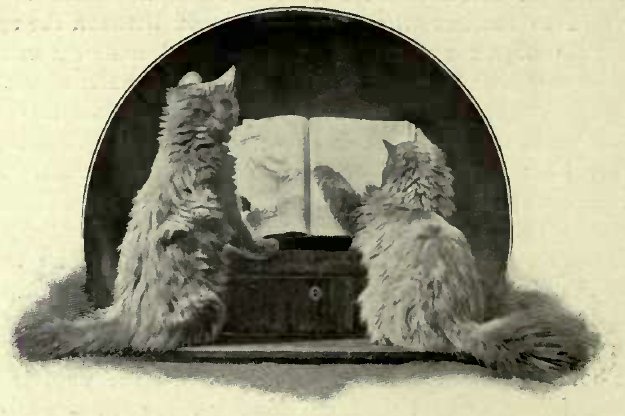III. CARE AND MANAGEMENT
Texte und Bilder aus “THE BOOK OF THE CAT” von Frances Simpson aus dem Jahre 1903
THE BOOK OF THE CAT
CHAPTER III.
CARE AND MANAGEMENT
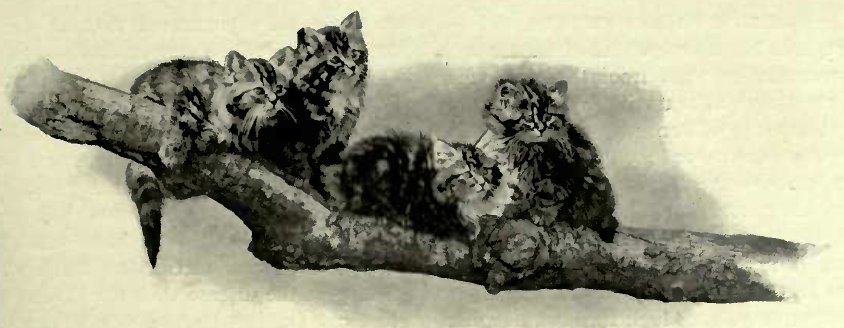
In the care, management, and feeding of cats no hard and fast rule can be laid down, for the dispositions and constitutions of these animals differ just as much as do those of human beings. Fanciers must therefore learn to treat their cats individually and not collectively; they must study then-character and make allowances for the fads and fancies of the feline race. I am convinced that a varied diet is the best for cats, and fanciers should bear in mind the importance of regularity in the hours of feeding, whether two or three or four times a day. Fresh water should always be supplied, and unfinished food should not be left standing about. For one or two pet cats the scraps from the table given with judgment will probably suffice; but in the case of a large cattery with several inmates, some sort of system in feeding is necessary. I would suggest that the chief meal for two days a week should be fish, mixed perhaps with rice or Freeman’s Scientific Food, raw meat twice or three times a week cut up into fairly small pieces, horse-flesh (if obtained from a reliable source) twice a week. Lights, liver, or sardines may be given occasionally.
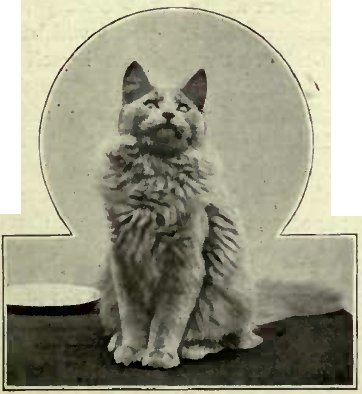
Sloppy food in any large quantity should be avoided; but oatmeal well boiled, cornflour, arrowroot, and several of the well-known foods, such as Neave’s or Mellin’s, make a nice change. Spratt’s biscuits of various kinds, soaked and mixed with stock, are relished by some cats. Vegetables should be given frequently, and grass supplied, as green food purifies the blood and keeps the bowels in good condition. Persian cats require special attention as regards their coats, and should be combed and brushed regularly, and, if the fur becomes matted, the knots should be cut away. Avoid washing your cats; there are other means of cleansing their coats, particulars of which will be given in the chapter on exhibiting.
Female Cats And Kittens
As regards the management of female cats, it is necessary to start from the time when they first arrive at maturity, viz. when they are first capable of becoming mothers. This usually takes place – or they “come in season,” as it is called – after they are seven or eight months old; and though cases have been known when this has happened before six months, it is very unusual. It may therefore be laid down as a rule that if a kitten exhibits extraordinary high spirits, racing and tearing about, it should be carefully watched, and not allowed its freedom without supervision, either out of doors or in the house.
Queens may be known to be in season by several symptoms, such as rolling on the ground, rubbing up against furniture, increased affection for their owners, and often by the curious cries they utter, at times by a soft note of invitation, at other times by shouts of impatience or distress which resound through the house. Cats should not be mated until they are nine or ten months old at least; twelve months is a better age, though if they are insistent it will not do to put them off more than three times, as there are records of cats who, having been kept back on account of extreme youth, have been seriously ill or have never had families at all.
On the other hand, it is possible these cats may have had the reproductive instinct abnormally strong, though for some cause or another they would always have been unfertile. Powders are sold to quiet cats who are considered too young to become mothers, and two or three small doses of bromide have a decidedly calming effect. This drug should, however, be given with caution, as it is a dangerous one in unskilled hands. Cats come in season about every three weeks during the spring and summer; but in the autumn and early winter months nature seems to intend that they should rest; therefore, as soon as the year has turned, and in very mild winters even before Christmas, no time should be lost in selecting the best sires for the various breeding queens, and arrangements made with their respective owners, so that as soon as ever a queen is ready she may be mated without delay, as some cats go off in two or three days, while others are not safe for a fortnight. If possible, it is well to select a stud cat near at hand, especially if your queen is timid and frightened, as a long railway journey may upset her.
It is most essential that female cats should be freed from worms before being allowed to mate or breed, otherwise the kittens will probably fall victims to these pests by sucking in the disease with the mother’s milk. Most cat fanciers know the symptoms which are suggestive of worms; and whenever there is a reasonable suspicion of their presence, then it is best at once to resort to some of the many remedies to be obtained from veterinaries and cat specialists.
A cat’s period of gestation is nine weeks, but this is often extended to a day or two longer, so that it is best to expect a litter about nine weeks from the date of the queen’s return from visiting the stud cat. An experienced breeder will most likely see symptoms of a cat coming in season, and will then do well to give a worm powder. Salvo’s No. 3 powder may be given one morning, and the cat sent off the next day quite safely. Visiting queens should be despatched as early in the morning as possible and insured, to save delay on the road, with the owner’s name and address inside package, also the name of the cat, as poor pussie will be far happier if on her arrival she hears herself called by her pet name. Full instructions should be sent as to the return journey; also it should be stated if the cat is kept out of doors or indoors, and what food she is accustomed to have, number of meals per diem, etc. If going a very long journey the queen should not be nailed into a box, or padlocked, as occasional delays occur, and the railway authorities will feed and look after an insured cat if packed in a hamper or box where they can get at the occupant. Boxes or hampers with skeleton lids are by far the best on this account.
If the weather is very cold and a basket is used, it should be lined, and round the sides brown paper is an additional safeguard against draughts, for which all stations are proverbial. A very delicate cat or young kitten finds great comfort in winter from a hot-water bottle placed inside the hamper for it to rest against. Queens should have a good meal an hour or two before starting, as they often arrive upset with the journey, and in their strange new home will not at first touch any food. Do not put any food in the travelling basket. It is not well for a queen to mate just after a heavy meal.
Fish and warm milk, if these agree with the queen, or a small meat meal, may be offered after a long, cold journey, and, if eaten, the queen should be allowed to rest an hour or two before introducing her to the stud cat.
After mating, a queen should be kept quiet for a few days on her return home, as much apart from other cats as possible; but no uneasiness need be felt if the visit does not seem to have quieted the queen, as she will settle down in a few days and cease to think about her mate. With regard to treatment of cats in kitten, some queens are gentle and quiet, and very careful of themselves, others are exceedingly bad-tempered, fighting and quarrelling, while some amuse themselves by climbing up high places and jumping down, behaving in such a wild and excitable fashion that they not only endanger their own lives, but run the risk of bringing maimed and deformed offspring into the world. Cats such as these should be kept isolated, if possible, or at most with only one other quiet queen, and all high shelves or tall articles of furniture should be removed. It is always well to be very careful in handling cats in kitten. They must never be lifted up by their fore legs, but when absolutely necessary to move or carry them, both hands should be used to do so, one being placed under the body by the shoulders to carry the weight, while the other hand gently supports the hind-quarters; but the less a cat is lifted about the better.
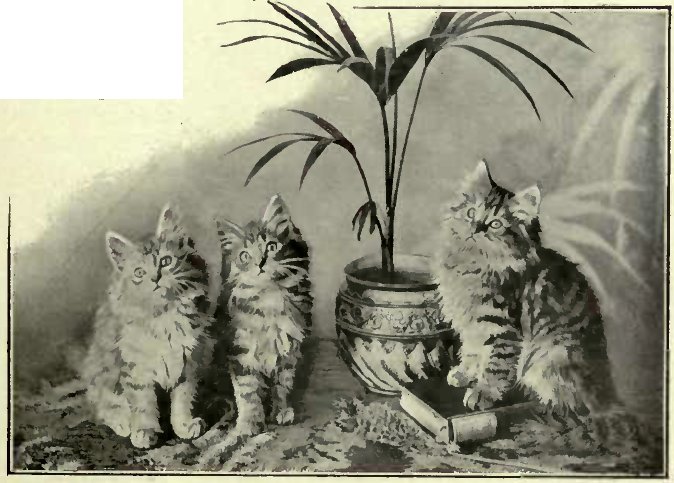
All medicines should be given quietly and quickly, so that there may be no struggling. The cat’s head should be grasped firmly with the left hand, the fingers and thumb on each side of the corners of the mouth, and forced back on the shoulders with a firm pressure; this will cause her to open her mouth, when medicine can be popped quickly down the throat from a spoon held in the right hand. In the case of a very restless cat, it is advisable to have an assistant in administering medicine. Amateurs would do well to practise giving water in a spoon to queens who are in health, so that they may become used to this simple method of administering medicine. Cats in kit require three or four meals daily of nourishing food – raw meat from four to six ounces night and morning, and fish and scraps and vegetables or biscuit, etc., for the midday meal. Half a teaspoonful of cod-liver oil on their food two or three times a week is very good for the queens in cold weather; but if sickness ensues, of course the oil must be discontinued. Never suffer diarrhoea to go on unchecked. This applies to all cats and kittens of whatever age, sex, or condition, but is especially dangerous when a cat is in kit or nursing her young.
Mr. Ward and Salvo prepare powders which will stop the diarrhoea, and if persevered with will restore the bowels to their normal condition. Change of diet is also very helpful. If the diarrhoea is very violent or persistent, or if no medicine can be procured, a small quantity of powdered chalk, as much as will lie on a sixpence, may be given every hour or two, three or four times: but the primary cause, of which diarrhoea is only a symptom, should be sought out, and if not discoverable, the advice of a cat doctor should be obtained.
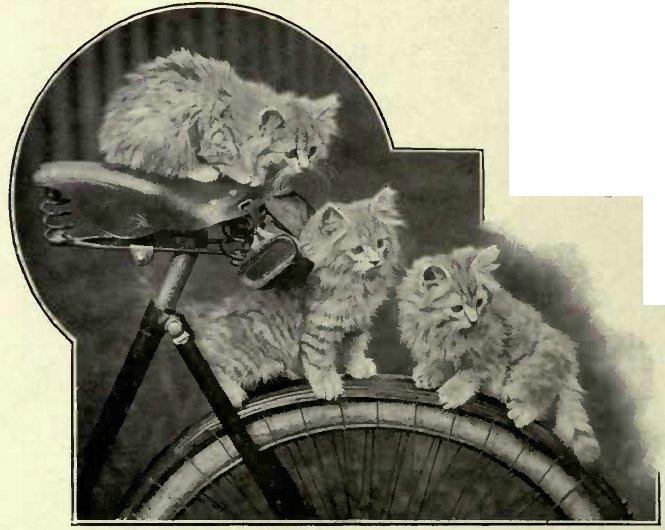
Persistent diarrhoea (if not the accompaniment of diseases, such as inflammation of the bowels, etc.), is usually caused by indigestion or worms, and sometimes by a stoppage of fur or food imperfectly digested, which nature in this way tries to get rid of; and if this is the case, or there is even reason to suspect it may be, a dose or two of warm salad oil, a teaspoonful every two hours, will often bring away the obstruction. Cats in kitten frequently suffer from constipation, for which also warm salad oil is far better than castor oil, as the latter is irritative to the bowels, and though acting as an aperient, the after effects are increased costiveness. Warm salad oil, given a few hours before the birth of kittens, is helpful to the mother. For at least a week before the kittens are expected, a nice cosy bed should be prepared in some retired spot; and, to a novice, the caution would not be amiss – do not let a cat in kitten sleep on your bed, or she will either have her kittens there, or will drag the poor little things into the bed the first chance she gets. If a box is to be made ready for the cat, it should be of a fair size (about twenty-six inches by eighteen inches), and should be placed on its side, and a bit of wood about three inches deep nailed on to the bottom of the side, standing up to keep the bedding in its place and the kittens from rolling out. This box may be placed on a table or two chairs, so arranged that the cat can step in and out from another chair.
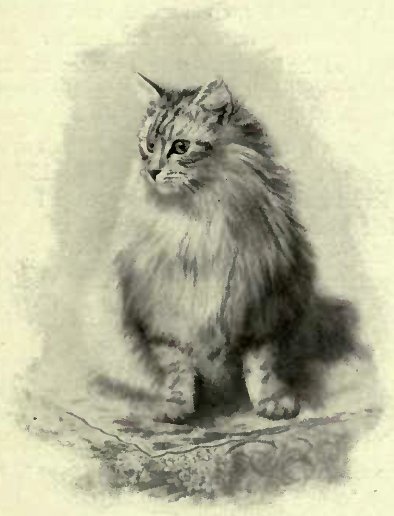
The floor of the box should be covered with several thicknesses of flannel or blanket in the winter and paper in the summer. Avoid coloured materials, as the dye will come out if they get wet. A bolster may be placed at one side of the box stuffed with straw, or hay or paper torn up very small, to support the cat’s back; but should the weather be very cold and the mother delicate, a hot-water bottle covered with flannel may be used instead, and is a great comfort. A covering should be thrown over the box, which may be pulled down to hide the interior, as cats love to be screened from observation; and also it is very essential that the tiny babies should be kept almost in the dark for the first fortnight, after which time, when their eyes are open, the covering can be raised in the day and lowered at night in cold weather. This box must be placed on the ground as soon as the kittens can walk about, but retaining the ledge already referred to, which will keep them from ground draughts to a great extent. A nice little box with run attached is the best house for a cat and kittens; but as these cost about 25s. each, a number of them become costly and beyond the means of some breeders.
The bed described is the next best thing, far better for shy queens than a box or basket used in the ordinary way. An empty drawer makes a good place, but the kittens should be moved out of it as soon as they can see, as it is rather too dark and close after the blind period is past.
A cat should sleep in whatever bed is arranged for her for at least a week before the kittens are expected, and when that day arrives the queen should be carefully watched, as some cats will have their kittens anywhere if not looked after. For the sake of those new to the fancy, it may be as well to remark that cats become very restless, walking about sometimes purring loudly, and looking in cupboards and dark corners, while occasionally the first noticeable indication that the event is about to come off is that the fur behind is wet, and if this should be the case no time should be lost in carrying the cat most carefully to her bed, as the kittens may then be expected any moment. Some animals like to be left entirely alone while giving birth to their young; others, especially pets, prefer to have their owners near to them; but if there is any uncertainty it is better to leave her to herself.
Experienced breeders will know that should the labour be dry or very prolonged it is a great help to a cat to pass the hand firmly and slowly down the side during an expulsive pain, as the pressure will help the mother and hasten the birth of the kittens.
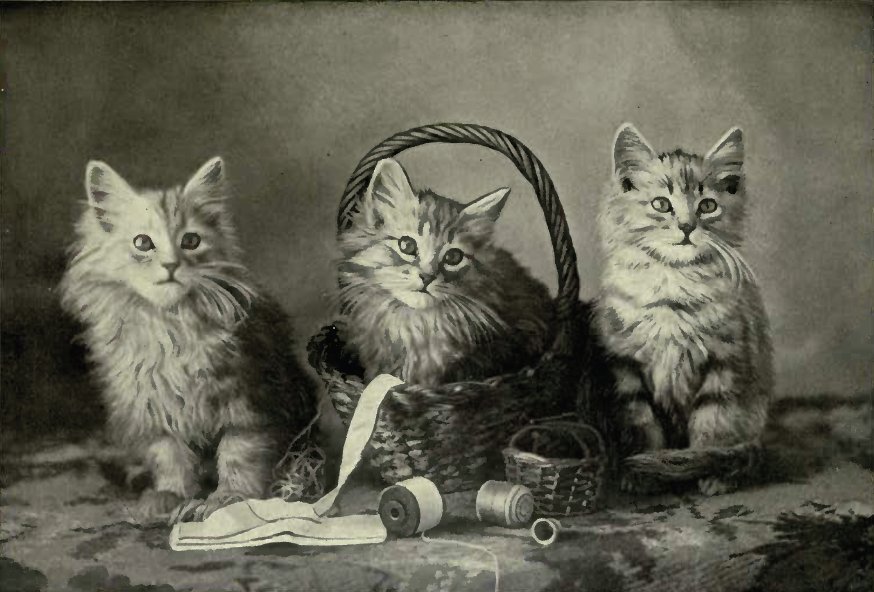
After the first is born, the rest come comparatively easily. Very occasionally there is a cross presentation; but as only those really competent should attempt to do anything in this case, no time should be lost in sending for the nearest cat doctor or veterinary. After the first kitten has arrived – the birth of which is usually heralded by a loud cry of pain from the mother – some milk should be made hot, and as soon as the new baby has been cleaned the mother will gladly drink this; but on no account should cold or even lukewarm milk be given the same day, or, indeed, for two or three days. Novices are sometimes startled at seeing the cat eating a lump of something which they fear may be a kitten; but there is no occasion for alarm, as it is merely the afterbirth, the consumption of which is probably Nature’s provision for affording sustenance to the mother, as an animal in a wild state could get no food for at least several hours after the birth of its offspring. If a cat is wild or shy, it is better to leave her alone (with the exception of offering hot milk from time to time) until all the kittens are born, and they should not be examined or handled for some days.
With a gentle queen the first kitten may be taken away when the second is born, well wrapped up in warm flannel and put by the fire, and so on, always leaving one kitten until the last is warm and dry, when the others should be returned to the mother. This plan is most necessary in cold weather (especially if the kittens are born out-of-doors), for if the labour is easy and quick it is quite impossible for the queen to dry one kitten before the advent of the next, and by the time they are all born they are frequently stone cold, and so wet that the mother gives up the attempt to dry them in despair; and many kittens, thought to be stillborn, have died in the night in this way. Kittens quite cold and nearly dead have been restored (and have lived to a good old age) by being taken at once to the fire and warmed and dried, and though at first life may appear extinct, time and patience will work wonders. If the kittens are taken away from the mother at birth as described above, it is a good opportunity for destroying any that are not wanted, because of sex or colour.
When the litter is given to the mother she should be offered milk again, and should after that be left alone several hours; but she will most likely welcome a few kind words and loving pats as a reward for all she has gone through, and will then cuddle down contentedly with her little ones. In giving milk do not take the mother out, or even make her get up to drink it, on the day of her confinement; if she cannot reach it comfortably, raise her head and shoulders with one hand until she can reach the saucer held in the other conveniently, and do not be in a hurry, as she knows well the temperature the milk Ought to be, and will not take it if too hot or too cold. Milk should be given night and morning, and offered during the day, for some days after the kittens are born. Cats that never like it at other times are thankful for it when nursing; but, on the other hand, cats that have been fond of milk will turn away from it at these times. Queens usually come out every few hours for food, and their meat or ordinary meal should be ready for them, as they will want to eat it quickly and return to their little ones.
After the second or third day a warm, clean blanket should be substituted for the one on which the kittens were born, and it is well to do this when the mother is present, as some cats resent interference during their absence.
As soon as the kittens are about a week old, a finger should be passed over their eyes, and if there is a little ridge on the lids, the eye should be moistened with eye-lotion twice daily with a camel-hair brush. If, after ten days, they do not open as is usual, the eyes should be sponged with warm water, as in this case they must have become glued together with mucus, which should be cleared away, and the eye moistened with eye-lotion, taking care a little goes well into the eye. The lid should then be smeared with olive oil to prevent adhesion. It is this adhesion of the lids which causes inflammation, and the eyes must be frequently attended to, so that they may be kept open, avoiding any very strong light.
If the kittens are born indoors in the summer, windows should be kept open during the day, and when the little creatures are about a fortnight old put them out in the sunshine for au hour or so daily. The mother must be as well fed as she was before the kittens were born, but carefully notice if she suffers from diarrhoea, for if this is the case, and change of diet does not cure it, you may be certain that she is nursing too many kittens, and if some of them are not speedily removed you will lose them all.
If a foster-mother can be procured, by all means have one, accompanied by one of her own kittens if possible. Make a cosy bed for her, warming the blanket, and leave her in it till night, when, if she seems settled down, give her two or more kittens as the case may be, removing her own the following night. Do not attempt to interfere with the kittens while the mother is away, and act very gently, talking to, and stroking her so that she may not resent your interference. If no foster-mother can be procured, Mr. Ward, of Manchester, has a clever little appliance which he claims can be used instead of a foster-mother.
Some fanciers may take upon themselves the task of bringing up the kittens by hand, and in that case wrap them up in warm flannel, keeping them by the fire by day, and giving them a hot bottle at night, feeding with weak milk and water about every two hours (this should be about half and half), with a teaspoonful of lime-water to each cup of milk and water. It should be given warm, not hot, and the milk scalded, not boiled. In London or large towns unsweetened condensed milk is better than cow’s milk, as the colouring or preservative acids used by dairymen in the latter is very injurious to kittens. This condensed milk should be much diluted, and flavoured with small quantities of salt and sugar. If too strong or too sweet, the food will cause diarrhoea. Kittens will soon learn to suck out of an eggspoon; but do not give too much at once, or force the food down their little throats when they object to take any more.
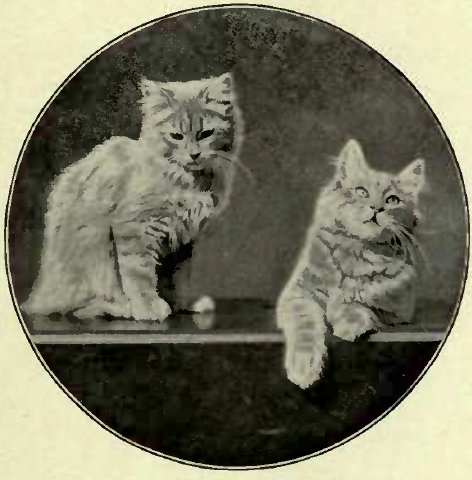
At about five weeks old the kittens will begin to lap and possibly to eat. Many fanciers are delighted if they will eat and drink before a month old, and some make the serious mistake of trying to coax the little ones to eat solid food at this tender age. Such persons do not stop to think how weak are all the digestive organs of these tiny creatures. The milk of the mother supplies all that is needful for their growth and well-being until such time as Nature makes itself heard in her demands for further nourishment, and if substantial food is given to them too soon, or too strong, it merely goes through the stomach, passing out into the bowels undigested, decomposes, and forms slimy mucus which is the hotbed for worms, even if it does not set up inflammation of the bowels. More kittens die from worms and consumption of the bowels than from any other complaint, and much of this loss of life is directly traceable to strong food at too tender an age.
Lung disease, gastric catarrh, gastroenteritis, are all directly or indirectly set up by the non-assimilation of food; hence the supreme importance of giving nourishment which can be digested easily. After six weeks scraped raw beef may be given (if the kittens want to eat) three times daily in very small quantities, about half a teaspoonful to start with, and they may have warm milk and water with lime in it. This should be followed by Mellin’s, or Benger’s Frame Food, as directed for infants. It is advisable not to allow kittens to overload their stomachs, but to feed them about four times daily. If healthy they will eat eagerly, but not ravenously; a kitten who is greedy and precipitates itself into the saucer in its anxiety to get its dinner may be suspected of worms, and when about eight weeks old a course of Salvo’s No. 1 powders may be given with safety.
As soon as the kittens are about a month old, a shallow tin of dry earth or ashes (I do not recommend sawdust) should be provided for them, and it will well repay their owners to spend some portion of the day with the little ones and lift them into the earth-pan when necessary. If this is done two or three times, the lesson is probably learnt for life. Kittens are naturally clean, and will get out of their beds, and run about crying loudly for some accommodation for their wants; and if this is neglected the seeds of dirty habits are sown, and the poor untaught little ones reap a sad harvest of cuffs and sometimes kicks from servants, who naturally dislike the trouble caused by dirty house pets. Even in catteries cleanly habits in cats are much to be desired. If a cat or kitten gets into dirty ways, it should never be beaten and put into the tin, but should be gently stroked and coaxed into good habits. Those who only keep one or two queens will find that if they spend a few minutes playing with the kittens before their meals, they will be well rewarded by the quicker growth and better digestion of the little ones; but, of course, this is out of the question in a large cattery.
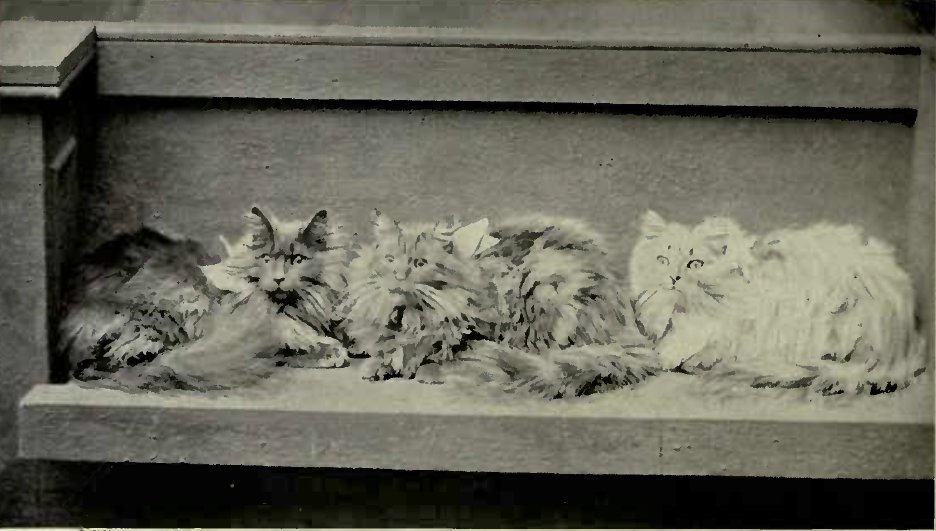
In summer, kittens should be combed daily with a small tooth tomb, as the insects which inhabit their coats not only worry them and cause them to scratch out their fur, but they convey disease from one to another, to say nothing of sucking out so much blood that the poor little creatures become absolutely anaemic, and in this state they fall an easy prey to the first disease that attacks them. Fleas were formerly treated as irritating but otherwise harmless insects; but we are assured on the best authority that they are a dangerous medium of disease, and that tape-worms are generated in dogs and cats by their means. The poor animals, wildly resenting the annoyance of these pests, hunt for them with teeth and tongue, and, swallowing their enemy, may also swallow a number of undeveloped tapeworms, which in their larval or grub state are secreted in the abdomen of the flea. Tapeworms are said to undergo certain metamorphoses or transformations, and require to pass through the body of some other creature than the one they exist in in their mature state of being.
It is a great mistake to keep kittens in heated rooms, and worse still to allow them to be close to a fire by day and then to let the room get cold at night. An even temperature, cold and dry, is better than sudden changes; cats and kittens love warmth and comfort, but, at the same time, all extremes of heat and cold are bad. Never neglect the first symptoms of illness; note the signs, and if you are not able to dose the invalid yourself send off a wire to some competent cat doctor describing the form the indisposition has taken, and while waiting for medicine no harm can be done by giving as much carbonate of soda as will lie on a threepenny-bit in a little water two or three times daily. Salvo has lately advertised a medicine which is said to be very valuable for giving on the first signs of a cat or kitten being out of sorts, and which, he says, will take down fever, stop colds, and modify attacks of bronchitis, pneumonia, etc.; and for such fragile little beings as kittens fanciers would do well to keep this medicine by them.
People often say that their cats and kittens seem ill or out of sorts, and allow this sort of thing to go on quite calmly for a week or so, when one day they wake up to the fact that the poor creature is very seriously ill, and they then send off in a hurry for medicine which frequently arrives too late; and the sufferer may be beyond all human aid.
Double pneumonia, which is perhaps the quickest and most fatal of all diseases, is not so sudden but that it is ushered in by various symptoms, beginning often a week before the attack becomes acute. An animal will seem cold, will creep near the fire, or sit in the fender, mope about, refusing to play, sit in a hunch with its back up, or is very sleepy and stupid; the fur is rough; there may be sickness, and the evacuations are of a bright yellow colour; perhaps it has not quite finished its meals for a few days; and the nose is hot and dry, and, if taken up, the cat feels hot and dry all over. When there are several of these symptoms, no time should be lost in administering the remedies named above every hour or two until suitable remedies can be obtained; but do not rely upon them alone, or think if you give them persistently they will pull the” animal through the illness, for they will not, special remedies being needed for special symptoms and for various stages of disease. No two animals are exactly alike, and the experienced cat doctor will prescribe carefully for each individual cat in the same way as a physician will give different prescriptions to suit the needs of different patients.
One thing should never be neglected, and this is keeping up the strength from the first with beef-tea, eggs and milk, Brand’s Essence, or animal Kreochyle – a teaspoonful every hour. As soon as an animal has refused two meals, begin feeding with spoon, as it will have so much more strength with which to battle against disease if fed up well from the first.
People who desire to sell kittens for profit will do well to part with them at about two months old, before they start teething, for at this period of their little lives fresh troubles begin. Occasionally they suffer from fits, but though these are sometimes caused by cutting their teeth, they are oftener due to the presence of worms. If the gums are swollen and inflamed, a quarter of one of Steedman’s teething powders will soothe them, or a few doses of bromide, as prescribed before for kittens desiring to mate too early, may be given, and excitable kittens should be kept quiet. If kittens are troubled with diarrhoea, all starchy food should be avoided, as it is never easily digested by animals. The reason of this is not far to seek, when we know that the saliva partly digests starch, while the juices of the stomach act directly on meat.
Animals, instead of masticating their food, by which means the saliva acts upon it, often bolt it, and it goes into the stomach and is passed out into the large bowel practically undigested, where it decomposes, working off in noxious gases which escape through the skin, causing eczema, or in many cases producing inflammation of the bowels or enteritis. Nothing needs more careful attention than the diet of kittens, and nothing is so little studied. It would be no exaggeration to say that all disease, apart from outside or accidental causes, such as draughts, cold winds, contagion, etc., is in the first place set up by undigested food, and even what may be called external causes would often not be harmful to an animal if the digestive organs were in proper working order. Remember, it is not the quantity of food a kitten takes that benefits it. The secret of its health and well-being is in the quantity it digests. A kitten should only digest certain things in certain proportions, and whatever remains undigested produces irritation, and in this case the kitten cannot possibly develop, and is generally weakly and fretful.
Those who have never cared much for cats will be interested and amused if they bring up a family of kittens, and the love and trust of the little creatures will well repay them for all their care.
Stud Cats
A male cat should not be allowed to mate under a year old, and if you wish to keep your stud in good condition do not allow more than two, or at most three, lady visitors a week. There is no doubt that a really reliable stud cat is a very profitable possession. The most essential recommendations are a sound constitution and absolute health, combined with a good pedigree and a list of prize-winning progeny. It is necessary to exhibit your stud cat at the best cat shows from time to time, and thus to keep him before the public. It is also advisable to advertise him in the cat papers, and it is often useful to have a photograph to forward to fanciers who may be unable otherwise to obtain any idea of your cat. Needless to say that for stud purposes a cat should possess the highest possible qualifications of the breed to which he belongs, and a massive frame and broad head are most desirable in all stud cats, It is a good plan to allow the visiting queen to be within sight of the male for a short time before she is put in the stud cat’s house, and for this purpose it is convenient to have a small movable pen or hutch to place where the two pussies can hold catty conversation.
A stud cat cannot, for many and obvious reasons, be allowed his full freedom; but it is essential that his dwelling place should have as long and roomy an exercise ground as possible. It is also possible with some male cats to tether them out-of-doors for a short period during the day, in which case great care should be taken to have the lead only as long as will permit of exercise within a safe distance of dangerous pitfalls or spreading trees and shrubs. The best time for mating is about one hour after feeding.
It is most important that stud cats should be in good coat at the time of mating, and that they should be free from worms.
The usual fee for a visit to a stud cat is £1 1s., and this should be sent at the same time as the request for permission to send a queen. A second visit is generally considered allowable if the first one has proved unsuccessful. An additional amount of food may be given to a cat whilst he is being used at stud, and always remember to provide grass in some form or other in your stud cat’s house.
There is no universal remedy for all cats, neither can there be any rule for feeding them. Different cats need different treatment, and those which are kept in a captive state, as are stud cats, should not be fed on the same lines as those that are allowed full liberty.
Neuter Cats
Opinions differ as to the best period for a cat to be made neuter, but it is generally considered advisable to have the operation performed between the ages of five and eight months. A male cat can be kept as a household pet till he is about nine or ten months old without any unpleasantness, but after that period he must be relegated to an outside cattery or stud house. It is cruel to put off gelding a cat till he shows signs of wishing to mate, A duly qualified veterinary ought to be employed, and an anaesthetic used. The cat should be kept on a low diet for a day or two before and after the operation. It is very seldom that any evil effects ensue, and after a few days the puss is quite himself again. Neuter cats grow to an immense size, and the Persian varieties develop great length of fur, which is generally not shed so frequently or to such an extent as in the males and females. Neuter cats are very docile, and generally rather lazy-and listless; for this reason they are not accounted such good mousers.
Female cats can also be rendered sexless, but in their case the operation is more likely to be attended with dangerous results. I have heard it stated that a female cat ought to be allowed one litter of kittens before being operated upon. There are not many very fine neuters on exhibition at our shows, and this fact may perhaps be accounted for by reason of fanciers picking out weedy and altogether below the mark specimens of their litters to be gelded because they do not consider them worth keeping to breed from. In this way several poor specimens of neuters are to be seen with indifferent markings, white spots, incorrect coloured eyes, and long noses. For a home pet there is, of course, nothing to come up to a fine neuter cat who will not roam, who does not attract amorous females, and who is content to lie for hours stretched out on the drawing-room rug or the kitchen hearth, the admired of all admirers. From the lips of many noted breeders of Persian cats who have been troubled by wandering males and prolific females, I have heard the exclamation, ” I shall end by keeping only neuters!”
Cat owners in general, and lovers of neuters in particular, might do worse than agitate for more consideration to be extended to these grand pets at our leading shows, and I cannot help thinking that a neuter club or society might be formed to assist in this and other objects connected with the general improvement of our neuter cats.
